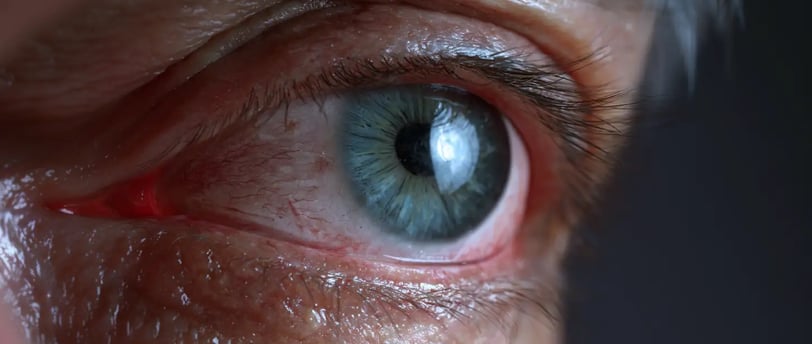eye-twitching-causes-remedies
Discover eye-twitching-causes-remedies in this guide. Learn why your eye twitches, find simple solutions, and know when to seek medical advice. Get relief now!
5/8/20244 min read


What Is This Twitch? The Technical Term Is Eyelid Myokymia
It sounds complicated, but it's not. "Eyelid Myokymia" is simply the technical term for small, involuntary contractions of your eyelid muscle. Think of it as a type of muscle "cramp" or "tic." Most of the time, it's a benign, temporary condition that affects only one eye at a time.
7 Common Causes for Eye Twitching (The Answer Is Usually Here)
The exact cause isn't always clear, but experts agree that eye twitching is often linked to our lifestyle. Think of it as a "warning sign" from your body.
1. Stress and Anxiety
The top cause of all. When we're stressed, our body releases hormones like cortisol, which put us in a "fight or flight" state. This heightened alert can cause muscle tension throughout the body, including the tiny, sensitive muscles around the eyes.
2. Fatigue and Lack of Sleep
Sleep is when our body repairs itself, including the nervous system. When we don't get enough sleep, our nerves become "overwhelmed" and more prone to sending incorrect signals, resulting in spasms.
3. Excessive Caffeine or Alcohol
Caffeine is a powerful stimulant. In excess, it can overstimulate muscles and nerves. Alcohol, in turn, can also interfere with muscle function and lead to these twitches, especially at night or the following day.
4. Eye Strain or Dry Eyes
Spending hours in front of computer or phone screens, straining to read, or needing glasses and not wearing them can tire your eye muscles. Dry eyes, very common in those who use screens or live in air-conditioned environments, can also cause irritation and twitching.
5. Allergies
When you have an allergic reaction, your body releases histamine. Rubbing eyes irritated by allergies can release even more histamine in the eyelid area, which can trigger twitches.
6. Nutritional Deficiencies: The Key Role of Magnesium
Here's a cause often overlooked! Certain nutrients are vital for proper communication between nerves and muscles. The deficiency of one in particular is directly linked to spasms and cramps: magnesium.
7. Medication Side Effects
In rarer cases, some medications, especially for epilepsy or mental health conditions, can have twitching as a side effect. This is something to discuss with your doctor if the symptom began after starting a new treatment.
How Can Magnesium Deficiency Make Your Eye Twitch?
Imagine magnesium as the "relaxation switch" for your muscles. It plays the role of helping muscle fibers relax after a contraction. When magnesium levels are low, it's as if this switch malfunctions. Muscles become more "excited" and prone to contracting on their own, causing spasms, cramps, and, yes, eye twitching.
You can naturally increase your magnesium intake through foods like:
Dark leafy greens (spinach, kale)
Seeds (pumpkin, sesame)
Almonds and nuts
Avocado
Dark chocolate
Banana
7 Practical and Immediate Tips to Relieve Twitching
Manage Stress: Take deep breaths. Take short breaks throughout the day. Meditating for 5 minutes can make a big difference.
Prioritize Sleep: Try to get 7 to 8 hours of sleep per night. Create a dark, quiet environment for better quality sleep.
Reduce Caffeine: Monitor your consumption of coffee, teas, and sodas. Try reducing the dose and see if the twitching improves.
Rest Your Eyes: If you work long hours on screens, use the 20-20-20 rule: every 20 minutes, look at something 20 feet (about 6 meters) away for 20 seconds.
Use Lubricating Eye Drops: If you suspect dry eyes, artificial tears can help lubricate and soothe them.
Increase Magnesium in Your Diet: Include more of the foods we listed above in your daily routine.
Apply Warm Compresses: Heat helps relax muscles. Apply a clean, warm towel over closed eyes for a few minutes before sleeping.
When Should You Worry and See a Doctor?
Although most cases are harmless and temporary, it's crucial to be aware of certain patterns that might indicate a condition requiring neurological evaluation. This is not to cause alarm, but to ensure you seek help at the right time.
It's time to talk to a doctor if you notice any of the following signs:
The twitching doesn't stop after several weeks, even with lifestyle changes.
Your eyelid completely closes with each twitch, making it difficult to open your eye. This is a key symptom of a condition called blepharospasm.
The spasm begins to spread to other parts of your face (mouth, cheek).
You notice redness, swelling, or any type of discharge from the eye.
Your upper eyelid appears visibly droopy (ptosis).
Additionally, in very rare cases, an eyelid twitch that is specifically triggered by closing your eyes against bright light can be a symptom of Jeavons Syndrome, a type of reflex epilepsy. This specific pattern ("closing eyes -> immediate twitch") is a clear reason to seek evaluation from a neurologist.
Conclusion
Most of the time, a twitching eye isn't a disease but rather a "message" from your body. It's a request to slow down, sleep better, manage stress, and perhaps review your diet. By listening to these small signals, you not only alleviate the symptom but also take care of your overall health. And by knowing the warning signs, you also empower yourself to seek professional help when truly necessary.
*Important Note: I am not a doctor or health professional. This article was created based on careful research of reliable health sources (which you will find listed at the end) to help you understand the possible causes of this symptom and find simple relief. If the twitching persists or concerns you, the recommendation is always to seek medical advice.
Research Sources and Further Reading: For the preparation of this article, information from renowned international health portals and institutions such as the American Academy of Ophthalmology (AAO), Mayo Clinic, Dystonia Medical Research Foundation, Epilepsy Foundation, and the MSD Manual were consulted.